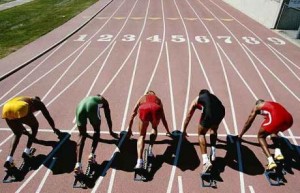 Athletes can sometimes sabotage their own success in sports. They “get in their own way” when they try too hard, force their game, over think and over analyze their performance. I’m sure you have heard me mention the phenomenon of “paralysis by over analysis.” If you or your athletes think too much or over analyze their performance, they don’t trust their skills and get in their own way. Athletes who allow their talents to shine can play freely, trust their skills, and don’t feel added pressure to be perfect when they perform.
Athletes can sometimes sabotage their own success in sports. They “get in their own way” when they try too hard, force their game, over think and over analyze their performance. I’m sure you have heard me mention the phenomenon of “paralysis by over analysis.” If you or your athletes think too much or over analyze their performance, they don’t trust their skills and get in their own way. Athletes who allow their talents to shine can play freely, trust their skills, and don’t feel added pressure to be perfect when they perform.
Coaches play an important role in an athletes’ mindset. Coaches want to do what they know and coach players. But there is a time and place for coaching and a time a place for letting athletes play the game. Coaches who over coach during games do not allow their players to perform intuitively and trust in the training. For example, do you correct technique and offer instruction during competition?. When coaches are too active during competition, athletes can over think or get confused with too much information, and thus can’t focus fully on the task. Athletes need to be free to perform instinctively after all the training is complete.
Legendary coach, John Wooden, offered some tips to help athletes trust in their practice.
“If you’ve done your job as a coach, you shouldn’t have to jump up and down and work for all that attention,” Wooden said. “If you’re the teacher, the game is the test and you never see teachers running around the classroom during the test. They shouldn’t have to.”
We know that Wooden is a very smart coach. Practice is a time to prepare your athletes for games. You teach players to improve technique and strategy during practice so that your team can perform with greater confidence in competition. When it’s time to compete, your role as a “teacher” is less important. You don’t want to overload your athletes with too much information. If you’ve prepared your team well, they should already know their role for competition. It’s time to trust that your team has put in the practice to perform their best on game-day.
To help your athletes perform with trust and not be over analytical, keep final instructions or coaching before the game to a minimum. Help your athletes focus on one or two objectives during the game. During competition, you must communicate with your players about strategy, but avoid over-coaching–let them play. If your players have not learned the proper technique prior to the start of the game, they won’t have time to get it during the game. Has Wooden says, use the game as a test for how much they are learning and retaining in practice.


























Great post. So many lessons are learned in sports besides how to run fast or get a ball into a target.